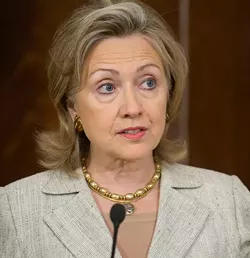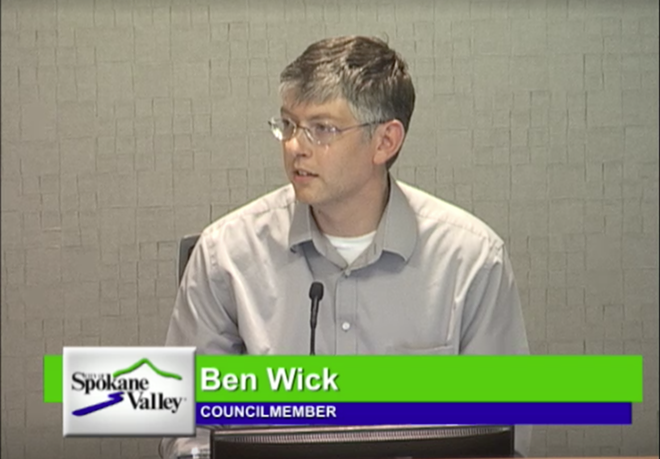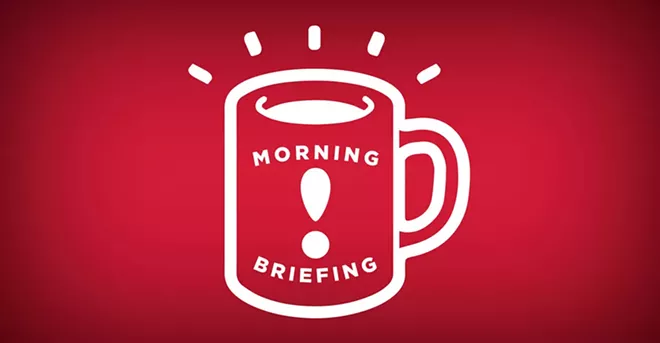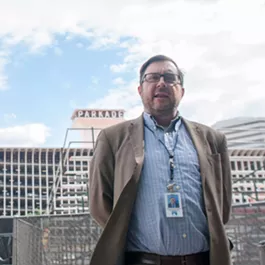Thursday, July 12, 2018

I've been commuting by bike to the Inlander for eight years, and so far it's been great. I've only been hit by cars twice — both times very politely.
That said, cycling in Spokane could still be even better. After all, there are some people who still drive places in cars. Trucks even!
Yesterday, Councilwoman Kate Burke held a "Bicyclists' Town Hall" to talk about some of the cycling projects that Spokane is working on and to get feedback from cyclists. They talked about the city's plan for a protected bike lane — a lane separated from automobile traffic by physical barriers like planters or posts — on Riverside Avenue through downtown. They discussed ideas like better signage, more bike racks, more trail connections and the fabled "Dutch intersection."
Burke says that attendees were mostly complimentary toward the city's improvements in the last decade, but were still critical of the city's choice to rehab streets like Sprague and Monroe without adding bike lanes. And she says pretty much everyone hates "sharrows," those painted bike-arrow symbols intended to guide cyclists on streets without bike lanes.
Tags: 25 things , humor , bicycling , For Fun! , News , Image
Wednesday, July 11, 2018
ON INLANDER.COM
NEWS: If you haven’t already, check out last week’s cover story about what a trade war with China would mean for Washington state, which is one of the most trade-dependent states in America.
NATION: The first wave of immigrant children separated from their families at the border have been reunited, the New York Times reports.
IN OTHER NEWS
Oh thank heaven
Possibly the best news you’ll hear all day: It’s July 11, meaning 7-Eleven is giving out free Slurpee’s. Now, go! (USA Today)
“Germany is totally controlled by Russia”
Trump has a bone to pick with Germany. The President had harsh words for the country and its leader during a NATO summit on Wednesday. (BBC)
Still the villain
Hillary Clinton is still the talk of Fox News. Is the former secretary of state, former first lady and presidential candidate making news? No. Yet, it seems she has become a necessary, maybe even vital, part of the news network’s programming. “Fox News has devoted itself to painting Trump as a protagonist, which can be hard given the scandals, the incompetence, and the cruelty. But with the perfectly crafted villain, anyone can be made a hero,” writes Alvin Chang. (Vox)
River poachers
A dozen redband trout were found dead in the Spokane River on Monday. It’s illegal to keep wild trout in the Spokane River. (Spokesman-Review)
Tags: spokane news , news , hillary clinton , redband trout , 7-Eleven , Image
Tuesday, July 10, 2018
MUSIC: Incubus, an actual good band, has a show tonight at Northern Quest Resort & Casino.
NEWS: The waitlist for Spokane's two charter schools stands at nearly 1,000. Here's why families are clamoring to get in.
IN OTHER NEWS
Trump picks Supreme Court nominee
President Donald Trump chose a solid conservative, Brett Kavanaugh, as his Supreme Court nominee. The choice would move the court firmly to the right. Trump says Kavanaugh is "one of the finest and sharpest legal minds of our time." (Associated Press)
Thai soccer team saved
After another rescue mission, the entire Thai soccer team trapped in a cave is out safe. "We are not sure if this is a miracle, science, or what," said the Thai Navy SEALS who helped rescue the team. (Associated Press)
Law and Order
President Trump granted pardons to two father-and-son cattle ranchers in Oregon whose prison sentences helped spark the 41-day occupation of the Malheur National Wildlife Refuge in 2016. The ranchers, Dwight Hammond Jr. and Steven Hammond, had been sentenced on charges of arson of public lands. (Washington Post)
Slowly reunited
Dozens (dozens!) of immigrant children under the age of 5 will be reunited with their parents Tuesday after being separated at the border by Trump's zero-tolerance immigration policy. But those children represent only about half of the roughly 100 children covered by an order to join their parents. More than 2,000 children total were separated from their parents under the policy. (Associated Press)
Spreading like wildfire
A fire that started around 11 pm last night in central Washington has forced the evacuation of Vantage and the closure of Interstate 90 in both directions. It's already grown to 1,000 acres. (Spokesman-Review)
Tags: thai soccer team , supreme court , brett kavanaugh , immigrant children , wildfire , News , Image
Monday, July 9, 2018
NEWS: The Washington State Court of Appeals found that a lower court was right to dismiss a murder charge against a former Eastern Washington University football player. According to the logic used by the Spokane County prosecutors, he could've been held responsible for his own death if the bullet in question hit him instead of a bystander, a judge said.
NEWS: Spokane City Council President Ben Stuckart supports minimum wage increases, but also understands there are genuine concerns for small businesses.
NEWS: A Spokane Valley councilman was removed from his Spokane Regional Transportation Council assignment without notice, and the people behind the vote admit it had little to do with his work on the council.
NEWS: A free life jacket loaner station has opened in Riggins, Idaho, to memorialize two men who drowned there and hopefully keep others safer on the water.
IN OTHER NEWS
Eight rescued from cave in Thailand
Over the weekend, rescuers were able to safely remove eight of the 13 people trapped in a cave in Thailand, through harrowing diving and climbing conditions within the tunnel system, which was flooded with rain water after the members of the soccer team and their coach entered it more than two weeks ago. (CNN, CBS)
Get rid of the plastic! Well, sorta...
Starbucks will get rid of plastic straws by 2020, meaning you'll be using an "adult sippy cup" soon enough for that frappucino, unless you bring your own reusable cup and straw. (NPR)
Spokane housing gets more competitive
Right now, it's easier to sell a home in Spokane, but finding one to buy means going up against competitors ready to jump on sales and make strong offers as they come in from more competitive markets, The Spokesman-Review reports.
The future is green
The growing of industrial hemp is closer to being legalized than ever, and Idaho could benefit in a major way if and when nationwide legalization passes, The Lewiston Tribune reports.
Tags: news , morning headlines , morning briefing , thailand , rescue , starbucks , spokane , straws , housing , minimum wage , court of appeals , spokane valley , Image
Sunday, July 8, 2018
Megan Lusk still returns to the area where her husband and their neighbor drowned in Salmon River near Riggins, Idaho. She and Pat were married for just over a year before the tragic accident in May 2015.
Pat Lusk and Jason Gritten had gone on a weekend camping trip. Their bodies were found later that month.
For the past two years, Megan Lusk has been pushing the city of Riggins to install a station where people will have access to free lifejackets.
Finally, this weekend, the lifejacket loaner station, along with a memorial for the two men, will be installed in the city park in Riggins — about two miles from where the men were found, she says.
"There have been several other deaths since then in that same spot," Megan Lusk says. "I hope that if people forgot or aren't thinking about it, having the lifejacket station there will help raise awareness."
She's also hoping the city will install more stations in the area.
"People wonder how I can go down there, but Patrick and I camped down in Riggins a lot. That was kind of our spot," she says. "That's where I lost my husband and our friend, but at the same time, I go down there to remember all the fun times we had."
Tags: Megan Lusk , Pat Lusk , Jason Gritten , Salmon River , Riggins , lifejacket , News , Image
Friday, July 6, 2018
Near the end of the most recent Spokane Valley City Council meeting on Tuesday, Mayor Rod Higgins decided he wanted to shake things up.
Though it was not on the agenda, Higgins made a motion to change the committee assignments for several council members.
The biggest change? Moving Councilman Ben Wick off of the Spokane Regional Transportation Council Board of Directors.
The motion passed in a 4-3 vote. And Wick, who was vice chairman of the SRTC, is still trying to figure out what he did to warrant such a move from the mayor.
"This is new to me," Wick said. "I guess I wish I had a little bit more of an understanding of what was happening to cause my removal."
Wick wasn't the only one taken aback by the move. Councilwomen Brandi Peetz and Linda Thompson also expressed confusion.
"I don't understand what the removal would be for," Peetz said.
But Higgins did not explain it. Neither did council members Arne Woodard, Sam Wood or Pam Haley, all of whom voted in favor of the committee reassignments. Woodard argued the mayor had no obligation to explain himself.
"He really doesn't have to give reasons," Woodard said. "Call it a gut feeling, if you will. Or he just had a bad apple today, or whatever it is. It doesn't really matter what the reasons are."
Wick served on the SRTC board before as chairman, during his previous stint as a Spokane Valley City Council member. He was on the citizen's advisory board for SRTC even when he wasn't a council member. Next week, he was planning on filling in as chair of the meeting because Al French, normally the chairman, was away.
"I'm sorry if I've done something to make it seem like I'm not a team player," Wick said Tuesday.
Reached by phone Friday, Wick still was at a loss to describe why he was taken off the SRTC. But he suspects it had little to do with the SRTC itself.
"I think it was just a punishment," Wick says. "But I'm not sure what for."
He does have his suspicions. He thought it may have had something to do with an article that ran in The Current, a Spokane Valley newspaper that Wick owns and publishes. Recently, the paper ran an article — not written by Wick — that city staff argued misstated its position on how the Mullan Trail Marker had been damaged.
Mayor Higgins, when reached by the Inlander Friday, didn't go into specifics on why Wick was taken off the SRTC. But he did suggest there were other factors at play.
"This has very little to do with the SRTC," Higgins says.
He described it as a "cumulative effect." The article in The Current was one reason for the decision, but not the only one.
"This was coming regardless," Higgins says.
Ideologically, the council is somewhat divided. Higgins, Woodard, Wood and, to a lesser extent, Haley, are further right than the other councilmembers. Appointing Wick to the SRTC, Higgins says, was an "olive branch" offered following the election. But Wick, Higgins says, has remained part of the "loyal opposition" on the council.
Even though it was never on the council agenda, Higgins says the move "was not intended to be a surprise."
The only people who did not seem surprised by the move were the other three council members who voted with Higgins. But Higgins strongly denies any meeting that would have violated open meetings laws. ("Hell no," he says.)
Wick says the move is concerning for Spokane Valley. Woodard, who is taking Wick's seat on the SRTC, can't take Wick's position as vice chair. And Wick says Woodard hasn't been part of the same conversation within the SRTC as Wick has.
"I think citizens of Spokane Valley are getting the short end of the stick," Wick says.
Tags: ben wick , spokane valley , rod higgins , spokane regional transporation council , srtc , News , Image

Washington state passed a state-wide initiative in 2016 that gradually ratchets up the minimum wage to 13.50 by the year 2020.
It was an initiative that City Council President Ben Stuckart supported, despite concerns from business owners that it would be a disaster.
And today? With Washington state's minimum wage at $11.50 and climbing, the economy is booming, including in Idaho-Washington border communities like Spokane. Our unemployment rate, as of May of this year, has fallen to 5.2 percent.
But instead of saying, 'I told you so', Stuckart took a different tack in an interview last week.
He suggested that many small business owners have told him they genuinely are having a tough time with the minimum wage increases. And Stuckart says he believes them. He says their experience is important to take into consideration when we talk about the minimum wage.
"I talk to my friends that run pizza parlors and bars and burger joints. I have a lot of friends who are small business people who talk to me about how the minimum wage increase is affecting them. And how it's a real issue," Stuckart says. "And these are people who are very supportive of me and who I am. But they like to tell me their real stories of how it affects their business and how they can't hire people even though they get busier because people have more money."
"We can all just say we're going to fight for $15 an hour," Stuckart continues. "But when you sit with a business person when they're feeling pain, you can't discount that pain."
He says that, as a public official, he has a duty to listen to those concerns.
"Some activist can spend all of their time shouting 'Fight for $15!' all they want," Stuckart says. "But me, if I'm making those decisions, and I hear the pain that small business owners in our town — numerous of them — are going through because of the rise of the minimum wage, I don't feel that I have a leg to stand on to just say, '$15 an hour no matter what.'"
He says he talks to small business owners, like those of Pacific Avenue Pizza, the Elk and David’s Pizza, and says he's sympathetic to their plight.
"I know enough of them, that everything about them — their values align with mine, their hearts are in the right place, and they're just telling it like it is and where the pain spots are," Stuckart says. "You can't discount that. You have to listen to that, and be aware of that and not be so adamant in your positions."
Stuckart's position on the minimum wage has long been a complicated one. And it still is.
Back in 2015, Stuckart adamantly disputed accusations that he wanted to increase Spokane's minimum wage to $15 an hour.
"I don’t think the $15 minimum wage is appropriate," he told the Inlander then. "I believe honestly that $15 is too high for Spokane.”
But two years later, during his brief run for Congress, Stuckart endorsed a federal $15 minimum wage, according to the Stranger profile.
Answering questions from the Spokane GOP, he defended minimum wage increases.
“I support increasing the minimum wage because I support what all of the studies that I’ve read and all the comparisons have shown,” Stuckart said.
He noted the large quantity of minimum wage research that suggested that a gradual minimum wage increase had minimal impacts on overall employment.
“I support the minimum wage
Today, he still says he wouldn't oppose a $15 an hour minimum wage — but only if it's implemented uniformly nationwide.
He still does not support pushing for a $15 minimum wage in Spokane and says he does not plan to push for another minimum wage increase locally as he runs for mayor.
Either way, he says, it's important to tie minimum wage increases to inflation, allowing wages to rise gradually instead of sudden leaps.
"I just think we need to do a better job in the future of indexing it every year so it's not big hits on businesses," Stuckart says. "And then we need to be careful of not discounting people's real-life experiences as we move forward."
The minimum wage, he suggests, is not the only tool you can use to fight income inequality.
"I try to talk about income inequality a lot. But then people go immediately to '$15 an hour minimum wage is
Tags: Minimum wage , Ben Stuckart , business , News , Image
The appeals court also upheld the court's dismissal of 12 of 14 drive-by shooting charges, and sent the case back to the lower court for dismissal of the remaining two drive-by charges.
In his opinion, Judge George Fearing expressed concern about Spokane County prosecutors' theory in charging Jameison, who did not fire the bullet that killed an innocent bystander.
"We worry about the ramifications of the state's theory of criminal liability," Fearing writes. "If one stretches the state's argument, LaShawn Jameison would be held responsible for his own murder," if the fatal bullet had struck him.
Jameison will soon be clear of all criminal liability for the deadly incident outside the shuttered Palomino Club in 2016, but he still has a long way to go.
"His reputation took a major hit, he got kicked out of school, lost his scholarship," Jameison's attorney, Josh Maurer, says via text message. Maurer adds that after his arrest, Jameison was unable to return a laptop computer he'd borrowed from EWU. The school charged him $50 per day and is refusing to release his transcripts until the fine is paid in full, Maurer says.
Jameison estimates the total is between $5,000 and $6,000.
EWU spokesman Dave Meany could not confirm whether Jameison has outstanding fines but says generally the school will withhold transcripts from students until they are paid in full.
In 2016, Jameison and his friend, Kwame Bates, were charged with first-degree murder by extreme indifference, along with 14 counts of drive-by shooting stemming from a gun battle outside of the Palomino Club.
A confrontation between Bates and another man, Anthony Williams, spilled into the parking lot after Williams apparently shoved a woman. Eventually, Williams retrieves a handgun, and surveillance footage shows both Bates and Jameison doing the same.
As Bates and Williams continue to talk back and forth, Jameison, who has said he could sense what was about to happen, and separates himself by crouching behind a nearby car while Bates stands near the car he drove to the club, according to court documents.
Next, Williams fires at Bates, but instead hits Eduardo Villagomez, a bystander who was also an EWU student. A fleeing car then drives over Villagomez's body. He turned 21 years old just three days before.
Bates runs to where Jameison is crouched behind a car and returns multiple shots. Jameison also fires at most two shots, according to court documents. He has claimed that he only fired once. Neither Bates' nor Jameison's bullets hit anyone.
In charging Jameison with murder, Spokane prosecutors argued Jameison bore "accomplice liability," in Villagomez's death by arming himself and "squaring off" with Williams.
Jameison argued that he could not be held accountable for Villagomez's death because he was crouched and hiding behind a car when the fatal shot was fired.
The Court of Appeals rejected the state's argument. Fearing writes: "No evidence directly confirms that Jameison concurred in Williams shooting at Jameison's direction. Experience, common sense and logic easily depict Williams acting on his own without any consent from Jameison or Bates. The state in essence portrays LaShawn Jameison and Anthony Williams as agreeing to a duel. The totality of the undisputed facts, however, leads one to conclude that Jameison never consented to a duel."
Spokane County Prosecutor Larry Haskell says he is still reviewing the appeals court's opinion and has not yet decided whether he'll appeal to the state Supreme Court.
Tags: LaShawn Jameison , murder , Palomino Club , Washington State Court of Appeals , Eastern Washington University , News , Image
ON INLANDER.COM
NEWS: In a letter to the editor, Lisa Brown elaborates a tad on her immigration positions.
IN OTHER NEWS
Kiss from a Rose
The mysterious Amazon-package-shaped "Project Rose" has already altered transportation and transit plans. (KXLY)
Chicken suit
Lawsuit reveals new messy details about the late Zaycon Fresh bulk chicken business. (Spokesman-Review)
Crying wolf
New York Times Magazine digs deeper into the story of a wolf scientist — and how Washington State University punished him for holding the wrong views. (New York Times Magazine)
1, 2, 3, 4, I declare a trade war!
It's official, people. China and the United States are locked in a trade war of retaliatory tariffs. (New York Times)
Wouldn't be Pruitt at this juncture
EPA administrator Scott Pruitt sticks his head out from his cloud of scandals just long enough to resign. (Washington Post)
Tags: Morning headlines , News , Image
Thursday, July 5, 2018
ON INLANDER.COM
NEWS: City Council president and mayoral candidate Ben Stuckart would like to see a taller, denser Spokane.
NEWS: Should the left welcome Republicans in the resistance against the alt-right?
MUSIC: Meet the husband and wife pair looking to bring diversity to Spokane's music scene with synthesizers.
IN OTHER NEWS
Lady Liberty
A woman climbed the base of the Statue of Liberty on the Fourth of July to protest the separation of migrant families. (CNN)
Ninja mom
A Spokane teacher is looking to become the first mother to complete the American Ninja Warrior obstacle course. (Spokesman-Review)
Flashing lights
Newly installed flashing LED lights near the House of Charity shelter will alert downtown drivers to pedestrians crossing at Browne and Pacific and Division and Pacific. (KXLY)
Spokane is sad
A recent study found that Spokane has a higher rate of depression than the state and the U.S. (Spokesman-Review)
Tags: News , spokane new , ben stuckart , american ninja , statue of liberty , sad spokane , Image















